Chuck Feeney: The Billionaire Who Died Nearly Broke on Purpose
In a world where billionaires often flaunt their riches through yachts, mansions, and media empires, Chuck Feeney chose a different path—one of quiet generosity, deliberate modesty, and unwavering purpose. As the co-founder of Duty Free Shoppers (DFS), Feeney amassed a fortune worth over $8 billion. Yet, by the time of his death in 2023, he had less than $2 million to his name—not due to bad investments or scandal, but because he gave nearly all of it away. Chuck Feeney’s life story is not just remarkable—it is revolutionary in the world of philanthropy.
SUCCESS STORYWEALTH OF THE HEARTUNSEEN TO UNFORGETTABLE
Thrivevision
5/28/20253 min read


A Fortune Built in Silence
Born in 1931 in Elizabeth, New Jersey, to Irish-American parents during the Great Depression, Charles Francis Feeney grew up with modest means and a strong work ethic. After serving in the U.S. Air Force, he attended Cornell University on the GI Bill, where he laid the foundation for his future empire.
In the 1960s, Feeney co-founded Duty Free Shoppers Group, capitalizing on the booming travel industry and the rise of luxury shopping among international travelers. DFS flourished, becoming a multi-billion-dollar business and making Feeney extraordinarily wealthy.
But unlike his peers, he wasn’t interested in fame or opulence. Feeney deliberately stayed out of the limelight, flew economy class, wore a $15 watch, and lived in a rented apartment. He even avoided owning a car. His lifestyle remained frugal, guided by the belief that wealth should be used to help others—not to elevate oneself.
Birth of a Secret Philanthropist
Feeney’s philanthropic journey officially began in 1982, when he quietly transferred nearly his entire fortune to his charitable foundation, The Atlantic Philanthropies. The move was so secretive that even his business partners didn’t know he no longer personally controlled the wealth. For over a decade, the foundation operated anonymously, funding projects across the globe in education, public health, social justice, and scientific research.
It wasn't until 1997, when a business-related court case required the foundation’s financial records to be disclosed, that Feeney’s extraordinary giving was revealed to the public.
Giving While Living
Feeney championed the idea of “Giving While Living”—the belief that wealthy individuals should actively donate their wealth during their lifetimes, rather than posthumously. This philosophy stood in stark contrast to traditional philanthropy, where large estates were often bequeathed after death.
He once remarked, “It’s a lot more fun to give while you’re alive than to give when you’re dead.” This ethos inspired others, including Bill Gates and Warren Buffett, to launch the Giving Pledge—a commitment by billionaires to donate the majority of their wealth during their lifetimes.
Feeney’s donations left a global footprint: over $3.7 billion to education (including massive contributions to Cornell University, his alma mater), $870 million to human rights and social change, and nearly $1 billion to healthcare initiatives worldwide. His foundation funded universities, hospitals, and peace initiatives in the U.S., Ireland, Vietnam, South Africa, and Australia.
Closing the Foundation—and His Final Years
True to his plan, Feeney set a deadline: Atlantic Philanthropies would spend all of its funds and shut down by 2020. The goal wasn’t to create a legacy through infrastructure or buildings bearing his name, but to spark change while he was still alive to witness its impact.
In 2020, at a small signing ceremony, Feeney officially closed the foundation. He was 89 years old and had successfully given away more than $8 billion.
He spent his final years in San Francisco with his wife, living in a modest apartment. When he passed away in October 2023 at the age of 92, he left behind not vast estates or corporate empires, but a legacy rooted in humanity, humility, and generosity.
Legacy of a Quiet Giant
Chuck Feeney’s story is not merely inspirational—it’s a blueprint for purposeful living. He showed the world that wealth, when wielded with wisdom and empathy, can transform lives far beyond one’s own.
He never sought statues or tributes, but his influence ripples across continents. Libraries, research labs, and educational programs funded by his giving continue to empower generations. His philosophy challenged the norms of wealth and inspired a new model of modern-day philanthropy—one that values quiet action over loud recognition.
In the age of headlines and hashtags, Chuck Feeney’s greatest accomplishment may be this: he proved that the richest life can be one lived simply, with open hands and a full heart.
Inspiration
Explore success stories and motivational journeys today.
Growth
Vision
© 2025. All rights reserved.
